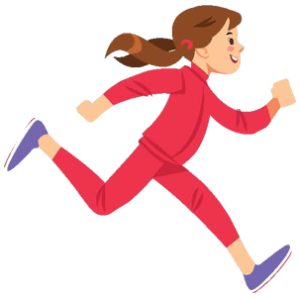A Focus on Empowering Girls
Mark Katz, PhD
Download PDF
While not designed specifically for girls with ADHD, Girls on the Run may be ideally suited to address the social and emotional needs of many of these children and young teens, aged eight to fourteen. Under the supervision of a trained coach, GOTR combines physical activity with a well-designed curriculum-based series of activities that can help build friendships and other personal relationships. The program also highlights and celebrates participants’ strengths and prepares them to handle life’s challenges.
 Participants meet twice weekly for eight to ten weeks. Each session begins with one of GOTR’s experiential activities, followed by running laps. The GOTR program culminates in a 5K run/walk. The workouts are designed to prepare girls for this event—and celebration.
Participants meet twice weekly for eight to ten weeks. Each session begins with one of GOTR’s experiential activities, followed by running laps. The GOTR program culminates in a 5K run/walk. The workouts are designed to prepare girls for this event—and celebration.
Three core programs comprise Girls on the Run. The first is designed for girls in grades three to five (GOTR); the second is designed for girls in grades six to eight (Heart & Sole); and the third serves girls in grades three to five during the summer (Camp GOTR). The weeklong Camp GOTR lessons focus on building friendships and fostering creativity—along with the universal program goals of keeping participants healthy, happy, and moving.
Molly Barker, MSW, started GOTR in Charlotte, North Carolina, back in 1996. A four-time Hawaii Ironman triathlete, Barker began running as a teenager and remembered its many benefits. To develop the original GOTR model, she drew upon her personal experiences, her counseling and teaching experiences, and her knowledge of adolescent research. Today, GOTR sites can be found throughout all fifty states, Washington, DC, and Canada. Approximately 200,000 girls participate in GOTR programs yearly, and more than 160 councils provide GOTR programs from coast to coast.
An independent study conducted by Maureen Weiss, PhD, cites specific benefits derived by girls who participate in the program, as well as their parents and participating schools. Ninety-seven percent of the girls indicated that they learned critical life skills, 94% of parents indicated that it was a valuable experience for their child, and 96% of schools indicated that they would offer the program again. This research study, cited below, found that GOTR is effective in teaching skills and strategies that generalize to broader life domains.
Why might GOTR match up well with the social and emotional needs of girls affected by ADHD? Three reasons. First, GOTR prides itself on embracing human differences and finding strength in our connectedness; this principle is among their expressed core values. Girls with ADHD are not only welcome, but will also find their learning differences legitimized rather than stigmatized. Second, a number of ADHD experts have explored the potential benefits of aerobic exercise, including running, on the functioning of both children and adults affected by ADHD. Girls with ADHD can benefit from the aerobic nature of the program. And third, other experts in the field have explored the emotional challenges that appear unique to girls and women with ADHD. Because GOTR is strengths-based and designed to increase a sense of belonging and a positive life outcome, the program may well benefit girls with ADHD.
Girls on the Run has been a 501(c)(3) nonprofit organization since 2000. There are program fees associated with participation and financial assistance is available. Elizabeth Kunz currently serves as GOTR’s CEO; a position she has held since 2008. She first learned about the program in 2002, and soon began serving as a volunteer. GOTR’s mission profoundly resonated with her back then, and still does today.
 A clinical and consulting psychologist, Mark Katz, PhD, is the director of Learning Development Services, an educational, psychological, and neuropsychological center in San Diego, California. As a contributing editor to Attention magazine, he writes the Promising Practices column and serves on the editorial advisory board. He is also a former member of CHADD’s professional advisory board and a recipient of the CHADD Hall of Fame Award.
A clinical and consulting psychologist, Mark Katz, PhD, is the director of Learning Development Services, an educational, psychological, and neuropsychological center in San Diego, California. As a contributing editor to Attention magazine, he writes the Promising Practices column and serves on the editorial advisory board. He is also a former member of CHADD’s professional advisory board and a recipient of the CHADD Hall of Fame Award.
FOR MORE INFO
Go to www.girlsontherun.org/about-us/ or email info@girlsontherun.org to learn more about GOTR.
To find a local GOTR council, go to www.girlsontherun.org/connect-locally/.
References
Weiss MR, Kipp LE, Reicher AP, and Bolter ND. (2020). Evaluating Girls on the Run in promoting positive youth development: Group comparisons on life skills transfer and social processes. Pediatric Exercise Science, 2, 172-182.
Other Articles in this Edition
Becoming Comfortable in Your Own Skin
Understanding ADHD from a Strengths-Based Perspective
From Meltdowns to Calm: Helping Children and Teens with Emotional Regulation
ADHD and Family Conflict: How to Reduce Verbal Aggression
Combined ADHD and Autism: How Would You Know?
Does Adult ADHD Increase the Risk of Dementia?
Do Older Drivers with ADHD Outgrow Their Crash Risk?
